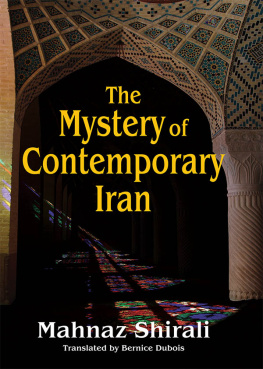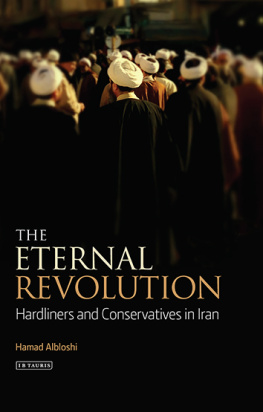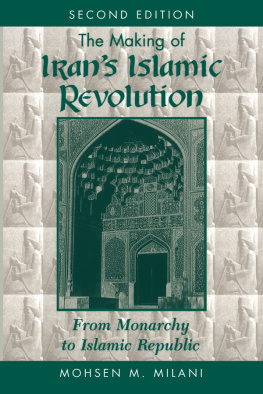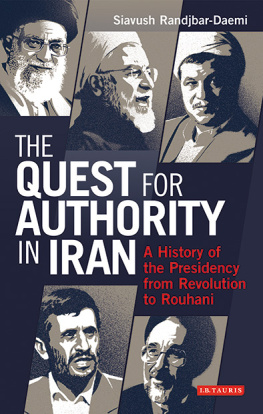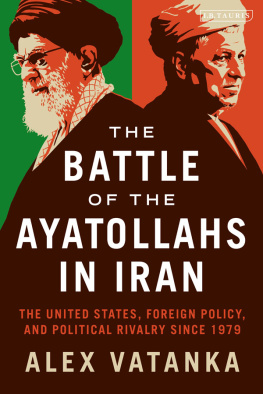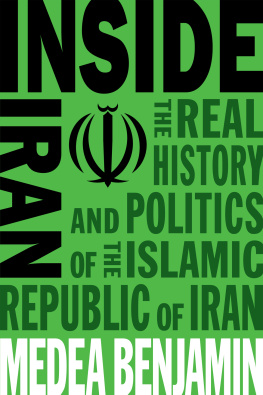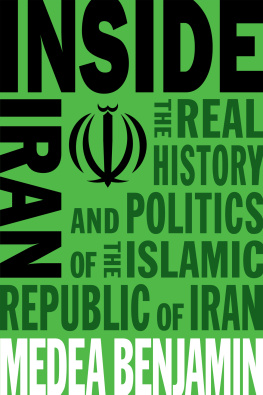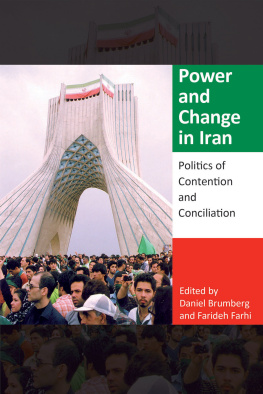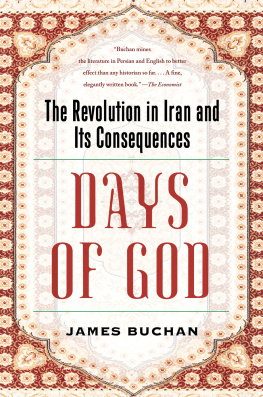First published 2015 by Transaction Publishers
Published 2017 by Routledge
2 Park Square, Milton Park, Abingdon, Oxon OX14 4RN
711 Third Avenue, New York, NY 10017, USA
Routledge is an imprint of the Taylor & Francis Group, an informa business
Copyright 2015 by Taylor & Francis
All rights reserved. No part of this book may be reprinted or reproduced or utilised in any form or by any electronic, mechanical, or other means, now known or hereafter invented, including photocopying and recording, or in any information storage or retrieval system, without permission in writing from the publishers.
Notice:
Product or corporate names may be trademarks or registered trademarks, and are used only for identification and explanation without intent to infringe.
Library of Congress Catalog Number: 2014006095
Library of Congress Cataloging-in-Publication Data
Shirali, Mahnaz.
[Malidiction du religieux. English]
The mystery of contemporary Iran / Mahnaz Shirali; translated from the French by Bernice Dubois.
pages cm
Includes bibliographical references and index.
ISBN 978-1-4128-5462-7 (acid-free paper) 1. Iran--Politics and government--20th century. 2. Iran--Religion--History--20th century. 3. Iran--Social conditions--20th century. 4. Islam and politics--Iran--History--20th century. 5. Social change--Iran--History--20th century. 6. Democracy--Iran--History--20th century. 7. Conservatism--Iran--History--20th century. 8. Clergy--Political activity--Iran--History--20th century. 9. Shiah--Iran--History--20th century. 10. Islam--Iran--Functionaries--History--20th century. I. Title. DS316.6.S55613 2015 955.05--dc23
DS316.6.S55613 2015
955.05--dc23
2014006095
ISBN 13: 978-1-4128-5462-7 (hbk)
I want to express my gratitude to Dominique Schnapper without
whom this book would not exist and its authors life would
have been very different.
In her last book, Mahnaz Shirali analyzed the return of young Muslims to an extremist Islam; they found there a compensation for the failure of their democratic hopes. Victims of collective choices made by French society, they felt frustrated and humiliated by their partial and ambiguous democratization. To this frustration and humiliation, the radical discourse of Muslim preacherssimplistic but thereby immediately understandablebrought an answer. Precisely because of their formalism, radicalism, and simplicity, so completely contrary to democratic values, these preachers fulfilled the needs and hopes of those who felt they had always been despised and insulted. To the democratic all is permitted, the preachers opposed an all is forbidden that conferred order and meaning on the world. Democracy allows each person the freedom to define the meaning he wants to give his existence, but not all have the social means to discover or invent this meaning alone. Mahnaz Shirali showed that the preachers words brought to these marginalized and unhappy youths, filled with resentment toward society, a moral security, enabling them to recover their dignity.
In that work, Mahnaz Shirali had already posed the problem of relations between Islam and democracy. She questioned the dogmatic closing that, since the thirteenth century, has frozen Islam in a literalism contrary to democratic modernity with its critical thought and individualist values, on which are founded a citizens community. Can this dogmatically closed Islam, which forbids free exercise of thought, particularly with regard to sacred texts, be opened to democracy founded on critical thinking and the value of criticism? She has often previously invoked the efforts of Muslim intellectuals to apply the scientific spirit to Islamic tradition and to change literalist conception of its texts.
She pursues this research in all its breadth in this new work where, probing deeply, she proposes a historic sociology of Iranian destiny in the twentieth century, torn between Shiite Islam and aspirations for modernity. She undoubtedly benefits from her past experience but, trained to rigor by the sociologists and philosophers of the Ecole des Hautes Etudes of Social Sciences, she develops an objective analysis of the great intellectual and political stages of a difficult and, at times, paradoxical road toward political modernity.
It is not Islam per se that opposes this advance, but the century-old overlapping between the Shiite religionand the clergy as a religious bodyand politics. The separation of politics from religion or the Great Separation, according to the formula proposed by Mark Lilla, echoing that of Karl Polanyis Great Transformation, founded political modernity. This idea is exceptional in history. In most civilizations, people called upon Gods authority to solve the problems of their lives together. Regimes organized by a political theology are normal, if we give this adjective its statistical meaning. Democracy constitutes a radical break. The proclamation of citizenship as the source of political legitimacy makes the separation of politics from religion a founding principle of democracy. Democratic society is not linked to the destiny of any clerical affiliation or belief system; it refuses to dictate to individuals the meaning they must give to their destiny by dictating a particular conception of this world or of what may lie beyond it. Henceforth, the social link is ensured by politics rather than by religion. Democratic society is autonomous, exclusively human; it no longer accepts any principle of heteronymous legitimacy.
Before this project attained consistency in European countries or those stemming from Europe, who invented modern democracy in action, centuries of rivalry and conflict had to be lived through. The need to reinterpret the relationship between the government, churches and religious groups, in the process of establishing an autonomous power in Europe, has imposed itself over time. How long will it take in Iran?
The imbrication, deep and close, of religion and politics in all structures of Iranian society is not the only obstacle to achieving political modernity. For Iranians, the democratic idea was brought into disrepute by their countrys contacts with the West. Democracy for them is linked to British and American imperialism. The national reaction of a country with a high and just idea of its own great culture linked the revolt against foreign powers to a rejection of democracy. If Iranians call themselves democrats, they harbor a strong mistrust toward democratic principles and societies.
What this exciting book shows, through the Iranian case study, are the obstacles encountered by any democratic project. Democracy is fragile. To establish it, it is not sufficient merely to respect elections and the way in which these take placeeven if this is essential because honest elections guarantee the legitimacy of those elected. One must first reflect clearly on the intellectual conditions of a new political legitimacy, accept the reinterpretation of traditions that, in all countries of the premodern world, closely associated religion and power. To prepare democracy supposes that this concept has been thoroughly thought through. Such efforts by Iranian thinkers, whose theories Mahnaz Shirali analyzes, never went all the way in critically reflecting on the heteronomy principle. They either did not know how to, or could not, radically question the meaning of religion. Hence their often pathetic efforts to conciliate values taken from various, sometimes contradictory, traditions. Their voices remained weak compared to the intellectual and political power of the clergy.

